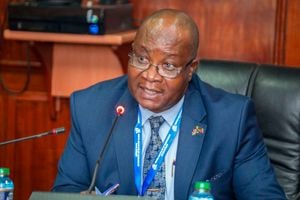
If the policy is implemented, Grade Eight candidates will choose between Kiswahili and sign language.
Kiswahili scholars and the Association of Swahili Teachers in Kenya have condemned a government policy that they say has downgraded the importance of the language by making it an optional subject in this year's Grade Eight national examinations.
Stakeholders have described the move as regressive at a time when East Africa's lingua franca is expected to play a greater role in regional integration.
Under the new policy, Kiswahili will no longer be a compulsory subject in the Grade Eight national examinations. If the policy is implemented, Grade Eight candidates, who are pioneers of the Competence-Based Curriculum (CBC), will choose between Kiswahili and sign language.
Speaking during the Kiswahili workshop in Eldoret, they described the move as regressive.
“It is unbelievable to tell me that the Kiswahili subject will no longer be a compulsory paper in the Standard Eight national examinations, according to a new government policy. This to me is just a rumour,” said Gabriel Mbeka, chairman of the Association of Secondary Kiswahili Teachers commonly known as CHAWAKIAMA.
Mbeka, a Kiswahili teacher at Matunda SA in Likuyani Sub-County, said the move was ill-advised as stakeholders were not involved in the drafting of the policy.
Mbeka urged the government to strengthen Kiswahili in schools instead of making it an optional subject.
“Countries like China are fighting to preserve and protect their languages, yet Kenya, as a country perceived to be an East Africa Powerhouse, seems to have no regard for our beautiful Swahili language,” Mbeka said.
He appealed to the Ministry of Education to rescind the decision and engage Kiswahili scholars in public participation to get the right opinion on how to promote Kiswahili as a language.
“Kenya should to make Kiswahili a compulsory subject right away from pre-school to higher level of education instead of making it an optional subject,” said Mbeka.
He also urged members of parliament to pass a bill to establish the Kiswahili Council of Kenya.
Similar sentiments were expressed by the chairman of the Council of Imams and Preachers of Kenya (CIPK), Sheikh Abubakar Bini.
“We urge our members of parliament to pass a Kiswahili bill that aims at the use of Kiswahili in the country as putting in place measures to safeguard Kiswahili as our heritage,” said Sheikh Bini.
He said Kiswahili must be given priority at all levels of government to promote our culture instead of promoting foreign languages.
Dr Allan Opijah, a lecturer in the Department of Languages at Moi University, urged MPs to expedite the establishment of the Kiswahili Council.
“It is unfortunate that we are yet to establish this important council yet the same members of parliament use Kiswahili language during campaigns. I urge our MPs to take this issue seriously and pass the bill so that we can have a Kiswahili Council like our brothers in Tanzania,” said Dr Opijah.
If Kenya establishes Kiswahili Council through an Act of Parliament, it will be the second country in the East African Community to do so after Tanzania.
Tanzania parliament National Swahili Council in 1967 through an act of parliament commonly referred to as the National Swahili Council Act, 1967.









